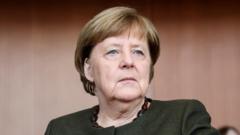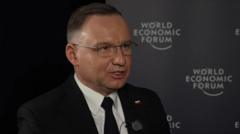The move to align with the far-right Alternative for Germany party for immigration legislation signals a troubling shift in Germany's political landscape, prompting significant public backlash amidst upcoming elections.
Germany's CDU Faces Scrutiny for Potential Far-Right Alliance on Immigration Legislation

Germany's CDU Faces Scrutiny for Potential Far-Right Alliance on Immigration Legislation
Friedrich Merz's precarious reliance on AfD support has ignited protests and criticism across Germany.
Friedrich Merz, leader of Germany's conservative CDU party, finds himself in a contentious position as he might seek the support of the far-right Alternative for Germany (AfD) for a critical immigration vote—a decision that has sparked outrage among political adversaries and citizens alike. Once adamant about distancing his party from the AfD, Merz is considering reliance on their votes to push through stricter immigration laws, prompting former Chancellor Angela Merkel to voice her disapproval.
Merz's defense of this controversial alliance stems from a pragmatic perspective, asserting that the effectiveness of policies should outweigh the politics of those who support them. He stated, “A right decision doesn’t become wrong just because the wrong people agree to it,” showcasing his stance in a politically charged environment. Despite claiming he never intended to seek the AfD's backing, the current realities of the CDU’s polling lead ahead of Germany's snap election next month may force his hand.
The mounting tension reflects in the streets, where thousands protested against the CDU’s collaboration with the far-right on Thursday evening. The upcoming parliamentary vote will not only consider a non-binding resolution already passed earlier in the week but will also address tangible legislation aimed at reducing immigration numbers and adjusting family reunion rights. This initiative is, however, likely to clash with European Union laws and faces staunch opposition from Merkel's successor, current Chancellor Olaf Scholz, who labeled the potential coalition with the AfD an "unforgivable mistake."
Amid the public protests and political fallout, the ongoing debate on immigration has intensified, primarily fueled by recent violent incidents involving asylum-seekers. With the political landscape shifting and a split emerging among party lines, the implications of Merz’s choices could resonate well beyond the upcoming election as the CDU navigates the delicate balance of maintaining democratic integrity while addressing national concerns over immigration.




















